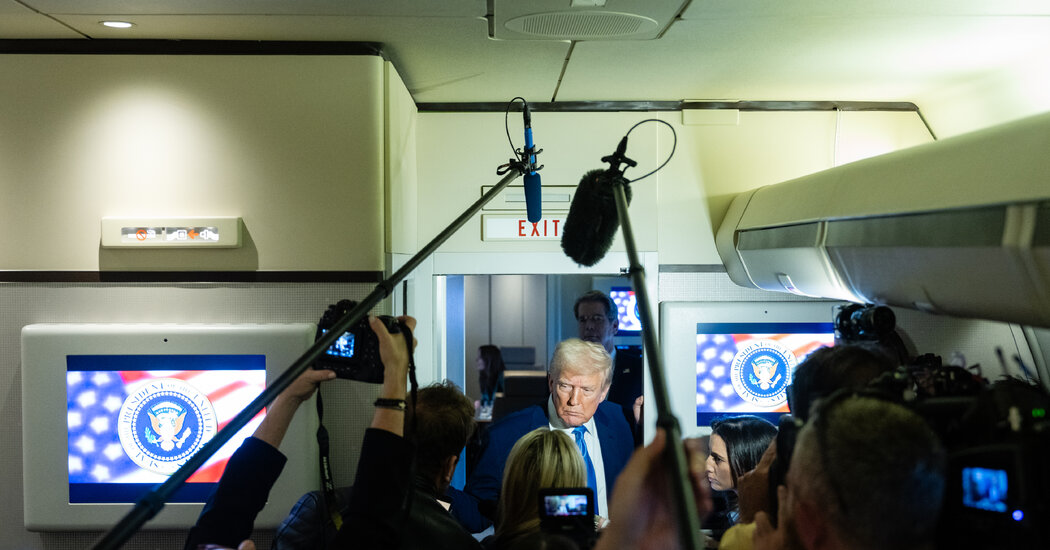China’s top leaders did not appear to fully grasp the power of artificial intelligence in July 2023, when one of us, Eric, and Henry Kissinger met them. Economic malaise hung in the air. But when the other of us, Selina, returned to China just 19 months later, the optimism was palpable.
Dinner conversations were dominated by DeepSeek and other A.I. chatbots. Electric cars whizzed by, while apps offered drone food delivery. Unitree humanoid robots danced and spun handkerchiefs onstage during the “Spring Festival Gala,” China’s most-watched TV program, making the company a household name overnight.
This is the country we’re dealing with. China is at parity or pulling ahead of the United States in a variety of technologies, notably at the A.I. frontier. And it has developed a real edge in how it disseminates, commercializes and manufactures tech. History has shown us that those who adopt and diffuse a technology the fastest wins.
So it’s no surprise that China has chosen to forcefully retaliate against America’s recent tariffs. To win the race for the future of technology, and in turn the war for global leadership, we must discard the belief that America is always ahead.
For a long time, China was slower to the game. In 2007, the year Steve Jobs unveiled Apple’s first iPhone, the internet revolution had barely begun across the Pacific: Only about 10 percent of China’s population was online, while the tech giant Alibaba was still seven years away from listing on the New York Stock Exchange.
The A.I. race appeared to follow the old pattern. The debut of ChatGPT in San Francisco in November 2022 led to a slew of copycat chatbots in China, most of which were estimated to be years behind. Yet, as with smartphones and electric vehicles, Silicon Valley failed to anticipate that China would find a way to swiftly develop a cheap yet state-of-the-art competitor. Today’s Chinese models are very close behind U.S. versions. In fact, DeepSeek’s March update to its V3 large language model is, by some benchmarks, the best non-reasoning model.
The stakes of this contest are high. Leading American companies have largely been developing proprietary A.I. models and charging for access, in part because their models cost hundreds of millions of dollars to train. Chinese A.I. firms have expanded their influence by freely distributing their models for the public to use, download and modify, which makes them more accessible to researchers and developers around the world.
Apps for the Chinese online retailers Shein and Temu and the social media platforms RedNote and TikTok are already among the most downloaded globally. Combine this with the continuing popularity of China’s free open-source A.I. models, and it’s not hard to imagine teenagers worldwide hooked on Chinese apps and A.I. companions, with autonomous Chinese-made agents organizing our lives, and businesses with services and products powered by Chinese models.
In the internet revolution, Western dominance of the market helped America’s digital economy swell to $2.6 trillion by 2022. That’s bigger than Canada’s entire G.D.P. For the United States to reap the benefits of the coming A.I. revolution, which is expected to have a larger impact than advent of the internet, the world needs to choose America’s computing stack — algorithms, apps, hardware — not China’s.
In a dozen years, China has gone from a “copycat nation” to a juggernaut with world-class products that have at times leapfrogged those in the West. Xiaomi — once best known as a maker of iPhone knockoffs — delivered 135,000 electric cars last year, while Apple gave up on its effort to produce an E.V. after burning $10 billion over a decade. China is now racing to deploy robots at scale, outlining plans for mass production of humanoids; in 2023, the country installed more industrial robots than all other nations combined. Along the way, the country also cultivated an abundance of STEM talent, robust supply chains, incredible manufacturing heft and a domestic ecosystem so brutally competitive that the only way to survive is to never stop iterating.
This China-dominated future is already arriving — unless we get our act together.
We should learn from what China has done well. The United States needs to openly share more of its A.I. technologies and research, innovate even faster and double down on diffusing A.I. throughout the economy.
Despite recent cuts in research funding, the United States continues to have remarkable strengths in university and private-sector innovation. Meanwhile, China is still playing catch-up on semiconductors. Additionally, the country faces significant headwinds of its own including a real estate crisis, mounting debt and weak consumer spending. That said, we wouldn’t underestimate the Chinese government’s resolve in tolerating near-term economic pain in pursuit of technological supremacy.
The United States imposed export controls on cutting-edge chips in order to stifle China’s A.I. progress. The country’s recent breakthroughs, however, illustrate that such sanctions instead fueled efforts by Chinese entrepreneurs to keep training and commercializing A.I.
At lunch during Selina’s trip to China, when U.S. export controls were brought up, someone joked, “America should sanction our men’s soccer team too so they will do better.” So that they will do better. It’s a hard truth to swallow, but Chinese tech has become better despite constraints, as Chinese entrepreneurs have found creative ways to do more with less. So it should be no surprise that the online response in China to American tariffs has been nationalistic and surprisingly optimistic: The public is hunkering down for a battle and think time is on Beijing’s side.
We’re no longer in the era when China is far behind us. If China’s capacity to innovate endures, if its A.I. companies continue to embrace openness, and if China stays on track to take over 45 percent of all global manufacturing by 2030, then the next chapter of the A.I. race will be an all-out dogfight on every axis possible. America will need every advantage it has.
Eric Schmidt, a former chief executive and chairman of Google, is the chairman and chief executive of Relativity Space. Selina Xu leads China and A.I. research in the Office of Eric Schmidt.
The Times is committed to publishing a diversity of letters to the editor. We’d like to hear what you think about this or any of our articles. Here are some tips. And here’s our email: letters@nytimes.com.
Follow the New York Times Opinion section on Facebook, Instagram, TikTok, Bluesky, WhatsApp and Threads.

